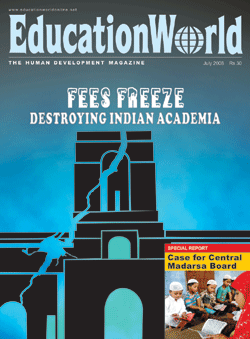 Your cover story ‘Fees freeze destroying Indian academia’ (EW July) was an eye opener. It’s incredible that tuition fees in some of India’s top colleges such as St. Stephen’s, Delhi and Presidency, Kolkata are as minimal as Rs.30 per month. But the real shocker is Delhi University where the tuition fee of Rs.18 per month has remained unchanged for the past 60 years. This needs to go down in Ripley’s Believe it or Not!
Your cover story ‘Fees freeze destroying Indian academia’ (EW July) was an eye opener. It’s incredible that tuition fees in some of India’s top colleges such as St. Stephen’s, Delhi and Presidency, Kolkata are as minimal as Rs.30 per month. But the real shocker is Delhi University where the tuition fee of Rs.18 per month has remained unchanged for the past 60 years. This needs to go down in Ripley’s Believe it or Not!
But as Summiya Yasmeen writes in her well-researched story, freezing tuition fees for decades has had a disastrous effect on the quality of education delivered in India’s over-subsidised colleges and universities. Forever strapped for cash and dependent on grudging government grants, higher education institutions simply don’t have the resources to provide world-class education and academic facilities. Little wonder that none of our varsities figure in the rankings of the top 500 universities of the world. It’s time the student community wised up that you get what you pay for! It’s surprising that even tertiary level students don’t understand that quality education comes at a price.
Savitri Shah
Delhi
Indisputable rationale
Thanks for making the case for a Central Madarsa Board in your special report (EW July). There’s little doubt that Muslims in India are socially, economically and educationally backward. Especially in the Hindi heartland states of Uttar Pradesh and Bihar, their status is worse than Dalits and scheduled castes and tribes. A combination of ignorance and poverty has forced many poor Muslim parents to shun government schools in favour of madarsas. They send their children to madarsas with the expectation that they will receive religious and mainstream education. But that’s not the case as the curriculums in these institutions are arbitrarily drawn up by mullahs, and impart little secular and/or vocational learning. Setting up a Central Madarsa Board akin to CBSE will not only standardise madarsa curric-ulums but will make their certification acceptable to higher educational institutions.
I’m sure no right-thinking Muslim can dispute the rationale of a board whose objective is provision of quality secular education to Muslim children. The Muslim middle class hasn’t openly been in favour of the Central Madarsa Board for fear of the bigoted Muslim clergy, who at the drop of a hat issue fatwas. This fear of being castigated by the clergy and humiliated in the community for being anti-Islamic has prevented the Muslim middle class from speaking up in favour of the madarsa board.
Zulfikar Ali
Mumbai
Unjustified complaint
It was very interesting to read your special report ‘Curious case of India’s unemployable engineers’ (EW June). The clamour for better quality from colleges is partially justifiable but industry on its part does little other than shout at the top of its voice. To put things in perspective, I have industry experience of 30 years and am currently teaching in a private engineering college affiliated with the Visveshwaraiah Technical University, Bangalore.
Today everybody seems to think ‘industry’ is synonymous with the software industry. Although it is a fact that 90 percent of engineers are employed in software and related industries, they are not trained for the software industry, particularly when they graduate in fields such as electronics, mechanical, electrical engineering etc. They are trained for areas other than software development.
Therefore how can the software industry complain they are not employable? As far as I am aware, engineers are not supposed to be employable immediately after graduation. Graduation has always been followed by plant training or apprenticeship. It’s just that the computer software industry is super cost-conscious and wants to make its bucks as fast as possible. That’s why they keep moaning about the high costs of 5-star training they incur.
The plain truth is that information technology is evolving too fast and it will never be possible for educational institutes to keep pace. Therefore all that an educational institution is supposed to do is to impart basic/fundamental knowledge that a student can use wherever he is employed.
If the Indian IT industry has to maintain its global edge, it must collaborate with engineering colleges and universities and help them frame their syllabuses — not introduce industry specific courses — so that graduates are widely employable. Thereafter industry must take on the burden of training fresh engineers for plant specific skills. Companies demanding knowledge of specific application software, as they are doing currently, is unreasonable.
Dr. M.S. Suresh
BNMIT College, Bangalore
Explaining Ryan success
The cover story ‘Success formula of India’s fastest growing schools chain’ (EW June) is a fitting exemplification of the dedicated efforts of Dr. and Mrs. Pinto to offer good quality English medium education at affordable prices.
The reasons for the success of the Ryan International Group are sheer determination and clear understanding of social needs by the promoters.
Zamarrudd Kalia
Mumbai
Serving the nation
The cover story on the Ryan International Group of Institutions (EW June) on the eve of their silver jubilee was excellent and inspirational. It’s note- worthy that an individual with a humble background but a great vision and mission, has created a niche for himself and promoted a chain of schools which is serving the nation by providing high quality English medium education.
Reshma on e-mail























